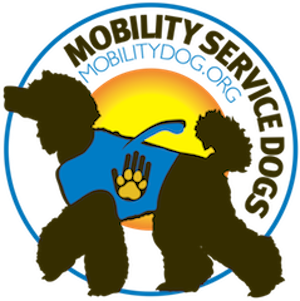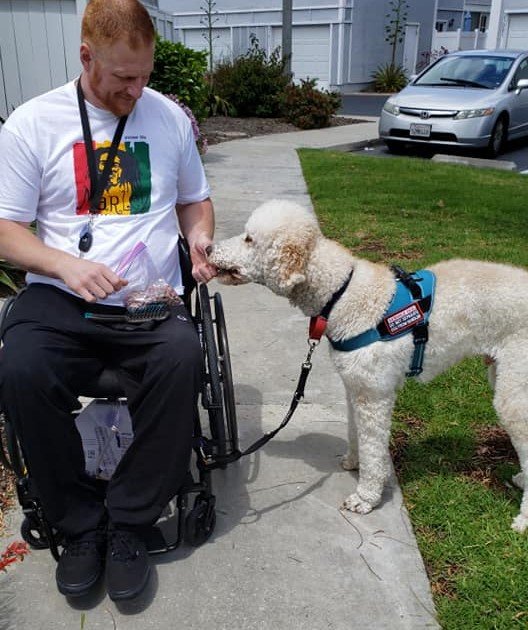Please Do Not Pet My Service Dog
If you’re a dog lover, there’s almost nothing more rewarding than a belly rub (for the dog, not you!) and a warm, “Who’s a good boy then!” Dog contact releases oxytocin, a hormone that increases a sense of affection and bonding.
But is it OK to gratify your need for doggy love when you encounter an on-duty service dog? Generally, the answer is no.
Service Dogs Are Not Pets
Service dogs are not ordinary pets. They are specially trained to perform tasks for their handlers (the users of a service animal). Like herding dogs and police and military K9s, they are hardworking pups. Just as you wouldn’t try to divert a herding dog from rounding up the sheep or a police dog from chasing a perp, don’t interfere with an on-duty service dog.
Not all service dogs have the same responsibilities, but all do have protection under the Americans with Disabilities Act (ADA). The ADA specifies that a service dog “must be trained to take a specific action when needed to assist the person with a disability.
Many wear vests or harnesses, though that’s not always the case. The ADA does not require that service animals display any sort of special ID tag, vest, or other explicit identification. Moreover, the handler is not required to carry any documents proving the dog is a service animal. So if you find yourself in the presence of what seems to be a service dog-handler pair, assume that’s what they are and keep a respectful distance.
Tips on how to Share the Space With a Service Dog (and Handler)
TEMPTED TO PET A SERVICE DOG? PLEASE DO NOT.
Remember, this dog is on the job, a team with its handler. The dog must remain continuously attentive to the handler’s surroundings and be ready to react as the need arises. Petting a service dog diverts the animal’s attention from its responsibilities. Moreover, a minute or two of petting may tell the dog that it’s OK to take a mental break in the middle of doing its job. This can be dangerous for both the dog and handler alike.WHAT ABOUT A QUICK PAT ON THE PUP’S HEAD AS YOU WALK BY? AGAIN, NO.
In the service dog community, people who do this are called “drive-by petters.” They wait for the handler to look away, then pet the dog as they walk by. This is not only disrespectful but also distracting to the dog. In addition, most states have laws prohibiting interference with or (heaven forbid) intentionally injuring or allowing another dog to injure a service dog.
DO NOT ASK SERVICE DOG HANDLERS WHY THEY HAVE THE DOG.
These working animals perform a variety of duties, such as helping their handlers with mobility, assisting with hearing or vision and alerting their owners of oncoming seizures. It’s presumptuous to assume that a handler wants to talk about the dog or tell you why they need assistance. Like you, they may simply want to ride the bus, walk down the street or buy a box of cereal in peace, without indulging your curiosity. It may not be obvious why a person needs help, and that may be just the way they want it.
KEEP YOUR POOCH AWAY FROM THE SERVICE DOG.
As a dog person, you know nothing distracts a pup like another pup! Do not make a service dog’s task more difficult by deflecting attention away from the handler. The dog is already working hard to stay focused in a world full of enticing sights, sounds and smells. Do not make the job harder by hijacking the dog’s attention with your bouncy beast.
Proper interaction with a service dog requires a simple realization: give the dog and the handler the space they deserve to function as smoothly as possible in a challenging environment. These special pups make it possible for their humans to get along in a world that is often indifferent – and occasionally hostile – to their efforts to live a normal life. Give service dogs the respect they deserve for the critical role they play.




